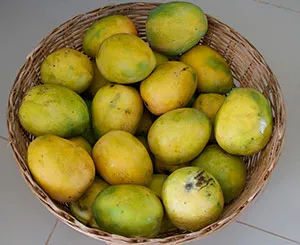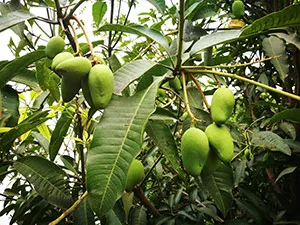African Mango Vs Regular Mango: What’s the Difference?
Not all mangoes are the same as African Mango. Most of the fruit supply in the western world comes from Brazil, Mexico or China and is a whole different family of fruits known as Mangifera. A selection of more than 400 different mango varieties is available in the market and Irvingia gabonensis belongs to a wild species found on the Western coast of Africa.
African Mango comes from the Irvingiaceae family while regular mango belongs to Mangifera. So, African Mango is especially valued for having a high content of fibre and its protein-rich seed.
Source: National Center for Biotechnology Information, U.S. National Library of Medicine.
How Does African Mango Work?
You may have seen African Mango on pop-up ads or viral blog posts. So why has it created a buzz on the Internet, and what does it do? According to a research study published in the Journal of Lipids in Health and Disease, this tropical fruit is gaining popularity for its ability to reduce body fat and lower leptin levels. The extracts obtained from African Mango kernels contain certain substances that are known to:
- Boost metabolism and trigger a multi-pronged attack on the fat cells
- Inhibit a body enzyme that converts body glucose into fat
- Increase the availability of Adiponectin; a hormone that impacts metabolism and helps regulate glucose levels
- Regulate Leptin; a hormone that affects metabolism and appetite and that signals your brain when you’ve eaten enough
- Stimulate metabolism and help you control your appetite
Due to these beneficial effects, African Mango is used in alternative medicines and also in pills, powders, and liquids that are created to promote weight loss. (1)
African Mango Benefits
If you are looking for a superfruit that will energise you, help fight free-radicals, and detox your body, add African Mango to your diet! Here are 10 more African Mango effects that can be great for your body:
Helps To Support Your Weight Loss Goals

According to a research study published by the National Center for Biotechnology Information, 208 participants who were on an African Mango diet for four to ten weeks, reported considerable changes in their body weight. (2)
Helps Cleanse Your Digestive System

African Mango contains enzymes that are beneficial in the breakdown of protein. Being fibrous in nature, this mango boosts digestive function and helps with detoxification and elimination.
African Mango Has A Rich Nutritional Profile

Processed foods and western diets are enriched or fortified and often strip your food of its nutrition. African Mango is loaded with essential vitamins and nutrients that are needed by the human body to function optimally.
Supports Clear Skin And Healthy Hair

African Mango is packed with skin-friendly nutrients including Vitamin A and Vitamin C, both of which are essential for skin and hair repair. African Mango also contains Vitamin E which is also great for improving skin texture and hair growth.
African Mango Is Good For Your Eyesight

Loaded with 25 different carotenoids, African Mango is a potent food that can help keep your eyesight sharper, for longer.
Helps Alkalise The Body

With a high content of malic acid, tartaric acid, and traces of citric acid, African Mango can be helpful in maintaining the body’s alkali reserve.
African Mango Helps To Lower Cholesterol Levels

Being fibrous and naturally rich in pectin and Vitamin C, the African mango is a potent combination that can be effective in lowering bad cholesterol.
Aids Memory And Concentration

African Mango contains Glutamine Acid which helps in boosting energy and keeping cells alive.
African Mango Is Rich In Iron Content

Being an incredible natural source of Iron, African Mango can be highly beneficial for people who suffer from Anemia.
Boosts Your Immunity

Vitamin C is a crucial source for immunity, and African Mango has a high amount of ascorbic acid which can boost your immune system. It gives you nearly 75% of the recommended value that your body needs on a daily basis.
How To Take African Mango for Maximum Benefits - In Supplements, Powders or Liquids?
Liquids generally contain the extracts of a single ingredient in a water base and some liquids are diluted to such an extent that no ingredients remain active in them. Powders may just have ground Irvingia seed but supplements can be synergistically formulated with other ingredients for laser-targeted weight management.
An African Mango supplement can be taken along with a healthy diet and fitness plan. All the extra fibre will help boost digestion and also help shed a few extra pounds! Always consult your doctor before starting with any supplements to ensure that the chemical composition suits your diet and your lifestyle and you don’t have any allergic reactions.
Bottom Line
The extract of the African Mango seed is shown to promote weight loss so aim for a market-leading formula that offers 5000mg strength in every serving, for maximum African Mango extract benefits. Do look for GMP certification and if it is gluten-free and vegan-friendly depending on your personal preferences. Avoid useless fillers and artificial colours and flavours. A supplement that has all of these features would make for a great way to boost your gym-game!



